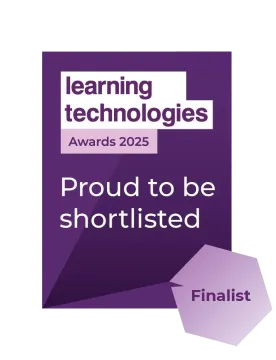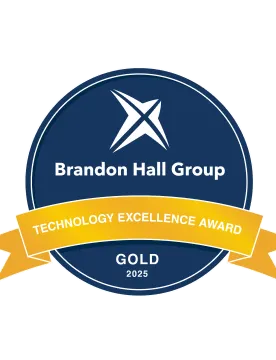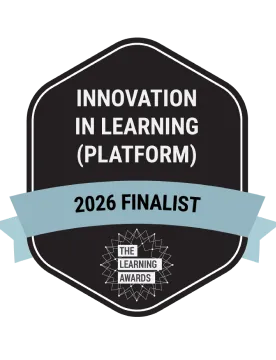We've been around for over 25 years. We're state funded and we aim to promote best practice in all aspects of dementia care. Since there are many misconceptions and misunderstandings around dementia out there - it’s often healthcare professionals who we need to educate the most.
The landscape of healthcare training has shifted dramatically, especially in the wake of COVID-19. Our traditional face-to-face training approaches were becoming increasingly impractical due to the challenges of staff shortages and the demanding nature of healthcare work. To address these issues, we ventured into the realm of microlearning with the help of 7taps.
Watch Matthew Gibb share his best practices—and actual microlearning examples—for how to enhance healthcare training. Powered by MicrolearningCONF.
"We looked closely at a number of different areas and different technologies that might help with this. And then we came across 7taps and we pretty much fell in love with it from the start. Really. It looked fantastic, it was very slick. But it also gave us an opportunity to take our learning in a completely different direction."
5-step system for creating micro healthcare training
Imagine trying to simplify a dense, extensive training program into smaller, focused modules. That was our task, and here’s how we managed it:
Step 1: Identify core topics and simplify content
We started by pinpointing the core topics essential for dementia care. For example, one of our first initiatives was improving the mealtime experience for people with dementia. We collaborated with nutritionists to condense a lengthy, informative booklet into a succinct microlearning module. Our goal was to make the information easily digestible and immediately applicable.
Start by getting clear on who your learners are. Download a free Learner Persona template (with examples from the healthcare industry).
Step 2: Integrate varied learning techniques
7taps allowed us to use a mix of educational tools to keep learners engaged. We incorporated flashcards, infographics, and even gamified elements into our modules. This not only kept the content interesting but also reinforced learning through different methods. It was crucial to make the learning process as interactive as possible to maintain the attention of busy healthcare professionals.
Step 3: Insist on mobile accessibility
A significant insight was that most of our staff, although lacking access to computers, always had their mobile phones. With some flexibility allowed by ward managers, we made sure our microlearning modules were accessible via mobile devices. This decision was pivotal as it allowed staff to engage with the training during their limited free moments.
Step 4: Address specific scenarios and challenges
We tackled common, practical issues faced by those caring for people with dementia, such as managing misplacement of items. By looking at specific problems and offering practical solutions, we created highly focused content that was immediately useful. This approach not only educated but also provided direct support to caregivers.
Step 5: Implement visuals and make it engaging
When it came to presenting complex concepts like person-centred care, we knew we had to step up our game. We broke down comprehensive content into three eight-minute modules, each focusing on a key aspect: responding to distress, respecting the person, and making a connection. By using quizzes and multimedia elements, we ensured that the content was engaging and easy to grasp.

🎁 Bonus tip: Tap into trends in an unexpected way.
We decided to subvert the traditional medical post at an event. In 2023 Barbie was massive in popular culture, so our team came up with “Operation Barbie” to communicate about how to talk to people about a dementia diagnosis. We got huge attention and engagement from this poster.
Results and takeaways
Switching to a mobile-first microlearning model, has hugely improved our ability to provide dementia care education. Here are some of the outcomes we’ve seen:
Increased Engagement
The interactive and varied format of our modules kept staff engaged. For instance, our person-centred care module became extremely popular, garnering attention and support from all levels of hospital management.
Enhanced Accessibility
By making our training mobile-friendly, we ensured that more staff could participate despite their busy schedules and lack of computer access.
Broader Reach
Our initiatives, including fun and out-of-the-box ideas like the Barbie-themed academic poster, significantly increased engagement at conferences and beyond, breaking through the usual sense of apathy.
Effective Learning
Breaking down complex topics into smaller, targeted chunks made the learning process more effective, ensuring that staff could easily understand and apply what they learned.

"The management teams are starting to take a huge interest in this whole process [and the] whole idea of concepts around microlearning as well."
Ready to use microlearning in your healthcare training?
If you’re looking to make your training programs more effective and engaging, consider diving into the world of microlearning with 7taps (it’s free to sign up and try!). It’s not just about shrinking content but about making learning more accessible, engaging, and impactful.
💡More microlearning ideas for healthcare training
- Deliver critical nurse education outside of an LMS
- Drive professional development in healthcare
- Implement mental health support system for medical workers







